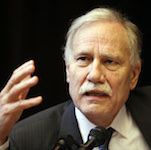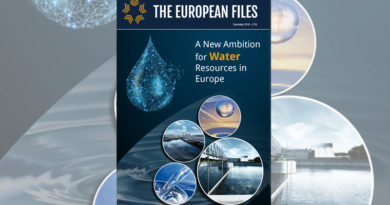
The European Defense Fund: ensuring industrial independence in Europe
The European Defense Industrial Development Programme (EDIDP), as a forerunner to a full-fledged European Defense Fund is a first step towards building a truly European industrial defense capability and thereby ensuring our industrial inde- pendence.
How do we get there? Take for instance our European Space Policy: One of the biggest achievements of the European Union is our common Space Policy.
With time, European space cooperation has created innovative programs such as Copernicus, now the World’s largest Earth Observation Programme or Galileo, a global satellite based navigation system worth more than 5 billion euros that is catching up fast on other systems such as GPS.
Alone, no single Member State would have been capable of launching 30 satellites by 2020. Europe’s space achievements show the tremendous opportunities offered by European cooperation.
When we in Europe unite our technological know how, our budgets and political will, chances are high for becoming an industrial leader, which is the baseline when we discuss our independence.
We are facing a real opportunity to create the foundations for such leadership in a field largely dominated by national prerogatives and sovereignty namely the European Defense Industry for the second time in European history.
In 1954 the French National Assembly refused to ratify the European Defense Community treaty with 319 votes against 264, despite the six founding Member states having all signed the Treaty two years before.
With the EDIDP on the one hand and the Permanent Structured Cooperation Mechanism on the other, we are waking the EU’s sleeping beauty from her 64 years long sleep.
European cooperation for the defense industry would undeniably represent substantive gains from both a technological and a financial standpoint.
In fact, the present situation is far from being optimal in this regard. More often than not, competing national R&D and innovation policies between Member States amount to an enormous waste of money and time for public and private companies.
As a whole, the possible economic benefits of such an integrated European Defense Industry are considerable and could reach more than 100 billion in savings, achieved through the efficiency of synergies between Member States.
The very first stepping stones towards a more integrated cooperation are defined now within the EDIDP.
This Programme, with its timid EUR 500 million for the next two years has the ambition of optimizing research, development and prototyping in the field of defense by supporting specific actions driven by at least 2 or 3 Member States.
Through a system of eligibility and award criteria, both smaller and bigger Member States, multinationals and SMEs will be incentivised to cooperate.
Logically and naturally, this will create economies of scale and harmonisation of policies, thereby strengthening our industrial base. This will of course takes time; it will be under the next financial framework that we will see the impact.
Nonetheless, the effectiveness of the EDIDP and the upcoming European Defense Fund in laying the grounds for industrial independence is inherently linked to the question of the beneficiaries of this Fund.
The participation of third country undertakings is incoherent with one of the overall purposes of this proposal, namely the guarantee of a strategic autonomy.
If under exceptional circumstances third country undertakings can participate in an action and benefit from the Fund under very strict conditions for the protection of our technological and industrial expertise, one could argue that such a clause to have a counterproductive effect on developing European leaders within for instance high technology and niche sectors of the defense industry.
This derogation clause could allow non European undertakings with solid credentials to out maneuver future European undertaking, mid-caps or SMEs with potential.
Would Americans or the Chinese have left such a door open to its European partners?
It remains to be seen what effect such a clause could or could not have on Europe’s industrial leadership and independence in the years ahead.
Overall, this programme remains a game changer for Europe’s industry, a golden opportunity to build a European defense industry based on cutting-edge technology to respond to the new world’s challenges and threats, and not only in the field of defense.
Defense research and development has long been known for its beneficial spillover effect on the civilian sector.
And it is worth underlining the competitive advantage of a military-industrial complex in the global economy.
The proposal for a European Defense Fund under the next MFF must become a genuine European integration instrument with an independent budget and governance.
We must reflect on the long-term consequences of the foundation we are laying in order to ensure a truly independent European Defense Industry.




